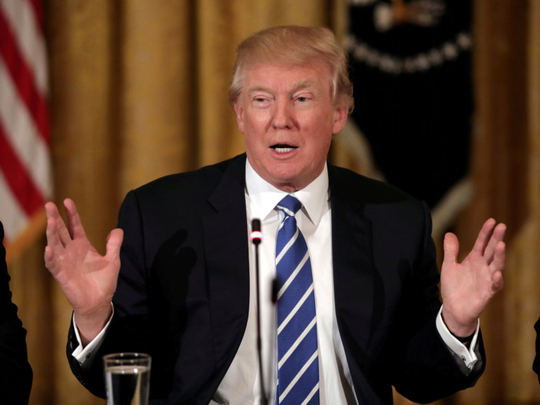
It is safe to say that the Palestinians were not expecting much from United States President Donald Trump’s phone call with Palestinian President Mahmoud Abbas, noted the London-based Pan-Arab paper Al Quds Al Arabi. “Expectations were at a bare minimum, particularly since a meeting was recently held between Trump and Israeli Prime Minister Benjamin Netanyahu. The phone call resulted in an invitation to Abbas to visit the White House, a move that exceeded the expectations of Palestinians. Based on Trump’s standards, who was once ready to turn the tables on the Palestinians, this is an important development. And based on the report that was published in this paper earlier, Trump had told Abbas that it was time to end the suffering that lasted for more than 70 years. Should we be expecting more surprises from Trump regarding the Palestinian issue? Perhaps the Palestinians should still be expecting the worst ...”
Trump’s invitation to Abbas carries with it many significance that one cannot help but ponder and thoroughly analyse, said Saudi Arabia’s Al Riyadh. “Trump’s stands on Palestine during his election campaign did not seem to be in the interests of resolving the long-standing Palestinian issue, with no practical solution looming on the horizon despite the presence of foundations that could be built on to set the peace process off. But Trump has changed once he assumed office; as he delayed moving the US embassy to occupied Jerusalem. The US never took the Palestinian issue seriously. It neutralised the role of the Quartet on the Middle East, driving it into obscurity. Therefore, the US administration must perform the role of an unbiased international broker that leads the peace process.”
The White House issued a statement on the phone call between Trump and Abbas, confirming the president’s “personal belief that peace is possible and that the time has come to make a deal”, wrote the Jordan Times. “What should guide any ‘peace talk’ should be the relevant United Nations resolutions and international legitimacy, whereby Palestinians attain freedom from occupation and can enjoy the inalienable right to self-determination by establishing a state on Palestinian soil with occupied East Jerusalem as its capital ... What prevented the two sides from reaching a legitimate and lasting peace is not the mechanism or format of peace negotiations, but Israel’s constant refusal to endorse the two-state, the one-state or any other solution. The US president is full of surprises. Maybe he will come up with a pleasant one on the Israeli-Palestinian conflict.”
The phone call between Trump and Abbas, and the US President expressing his commitment to the peace process, was described as a ‘significant development’ by Palestine’s Al Quds.
“This development is a slap to the right-wing Israeli government that was betting on Palestinians not having a say in the matter. Trump reaffirming his commitment to a peace process that leads to true peace is a move that carries with it many indications; that Trump knows full well the stand of the Palestinian leadership, and that peace cannot be attained without the Palestinians enjoying their full rights to independence and freedom.”




_resources1_16a31069e4e_small.jpg)




